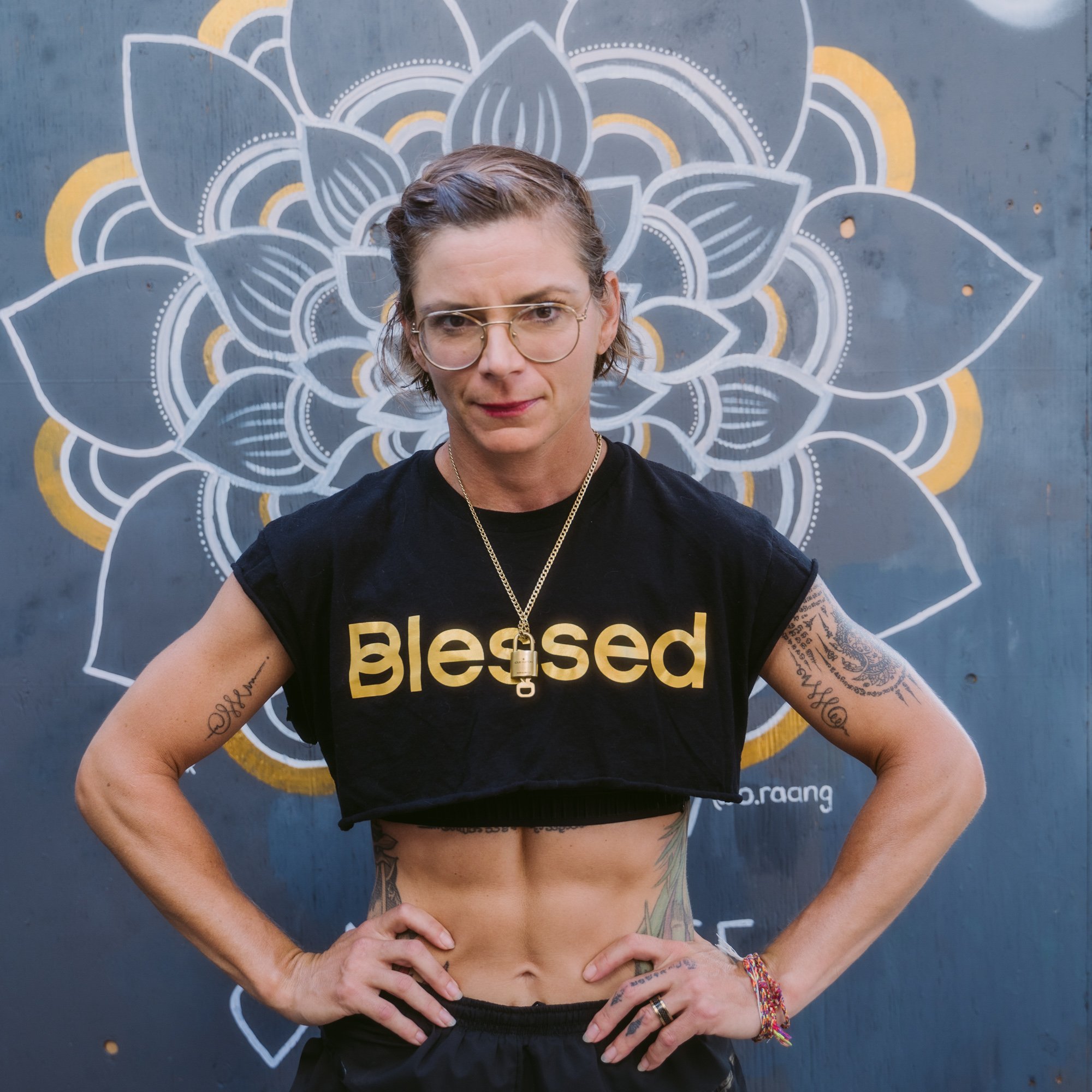A philosophy for athletes: train, treat, repeat
“Even though I could convince my mind to go and do and push, or not sleep and basically eat standing up, everything started to break down,” says Angelina Blessed—a Muaythai fighter and founder of the eponymous cannabis edibles company. “Something had to give.”
At Blessed’s beginnings, the company’s philosophy was incomplete. You can train all you want, but if you’re in pain, how do you repeat? This is something Angelina knew too well after years of rigorous training and 12 professional bouts under her belt. The realization that optimal performance consists of high-intensity work followed by deep recovery would change her approach to life and catapult her company into the spotlight.
Go hard or go home; hustle and grind; no days off. Take your pick of these “balls to the wall” mentalities and you’ll likely find yourself in a similar situation. First off, the “hustle hard” mentality is the antithesis of balance. The addiction to the idea that output equates progress comes from a place of ego. The endless pursuit of achievement by means of “grinding” to a goal is as damaging physically as it is emotionally. But when you’re in it, it’s hard to slow down without feeling like you’re falling behind.
To clarify, pushing for a goal serves a purpose but not at the expense of conditioning the mind to be plagued by anxiety or guilt for allowing rest in the process.
TRAIN. TREAT. REPEAT—THE RIGHT WAY
In 2014, Angelina started smoking cannabis for pain, and then started making edibles (butter and cookies) to feed “the boys at my gym.” In 2015, she entered the legacy market with an oatmeal cookie, which led to a documentary on VICE and winning 2nd Place in the 2017 LIFT Best Edible contest. “After that, I connected with one of the best chocolatiers in the market and the rest is blessed history,” she says.
During this time, she was also pushing her body to its extreme. She had her first fight in Thailand in 2006, trained with Muaythai champion Simon Marcus, and joined Team Canada in 2015. She has been training with Evan Boris of Striking Concepts since 2016.
“I’ve gone back every winter since, to build and train and fight,” she says. However, that same year, something happened: she also learned how to properly recover.
“Figuring out how to treat myself and incorporate self-care aspects into the elements of training was when everything came together,” she says. “Floating, acupuncture treatments, cannabis, cordyceps, and therapy were all introduced into my healing. Learning how to eat correctly for my workouts and for recovery became really important for my mental health, as well.”
A survey by the University of Colorado at Boulder found that nearly 80% of the 600 cannabis users surveyed said they believe it speeds recovery, 70% said it makes their workouts more enjoyable, and more than half said it improves their motivation. Those findings are helping to break the stoner stigmas of laziness and complacency. In fact, the survey found that those who said they use cannabis exercise 43 minutes more per week than people in the survey who don’t.
“I wish people could understand how well athletics and cannabis go together,” says Angelina. “I rip bongs and go for 10k runs and then rip another bong and come to the park and do all my bodyweight exercises.”
As the perception of who uses cannabis and why is steadily changing, a growing number of athletes are piling onto the “cannathlete” movement.
Liz Carmouche, one of the first females to introduce mixed martial arts (MMA) to the Ultimate Fighting Championship (UFC) when she competed against Ronda Rousey, openly talks about using CBD to heal.
Veteran UFC fighter Elias Theodorou has been granted a Therapeutic Use Exemption (TUE) for medical cannabis by the B.C. Athletic Commission, the first of its kind awarded to a professional in mixed martial art (MMA).
Snowboarder Ross Rebagliati, who was briefly stripped of his Olympic gold medal when he tested positive for cannabis, founded a medical cannabis business in Canada.
Former bodybuilder and distance runner Flavie Dokken says she uses it for an extra boost “the way you’d drink a cup of coffee in the morning” and after training to reduce joint pain. From the NFL and NBA to triathletes and cycling athletes, cannabis is slowly becoming less of a taboo topic among the fitness elite.
“I think athletes put themselves under incredible pressure,” says Angelina. “I would assume most are pushing themselves more than they probably should. I think everybody is looking for a break. A lot of athletes are already using cannabis, it’s just a matter of them actually talking about it.”
And Angelina believes it’s worth talking about.
Blessed is for athletes as much as it is for those who value an active lifestyle. The commonality is the need for balance, whether you’re training professionally or just getting started.
“I would go to sleep but at 3 a.m., and every time I would roll over, my sore body would wake me back up. Then when I would try to get up early to train but I hadn’t gotten the rest. My body was in so much pain and the workout the next day sucked.”
The shift came when she was able to go home, medicate, sleep, and wake up rested so her body had a chance to heal; this, mixed with meditation and sensory deprivation (floating).
“It’s not like cannabis heals everything, but the more sleep, the better you feel, the better you eat, the better workout you’ll have. Doing one thing right, and other things fall into place.”
The “go hard or go home” is as outdated as stoner stigmas. “Train, treat, repeat” is the new mantra and way forward for athletes at any level.




